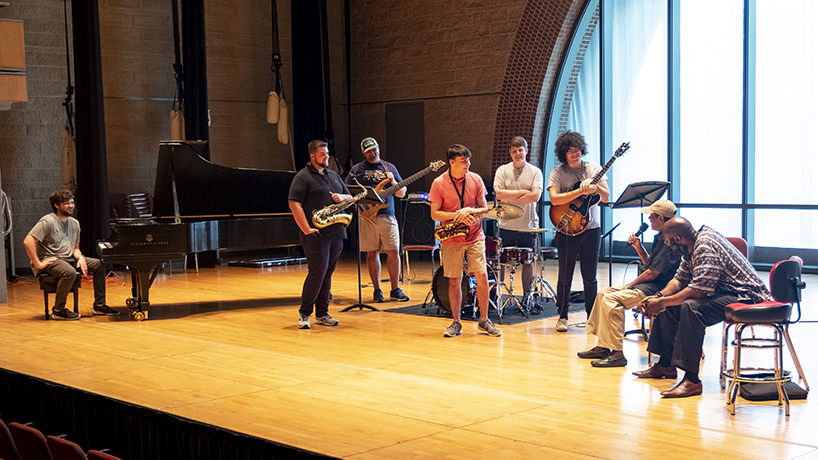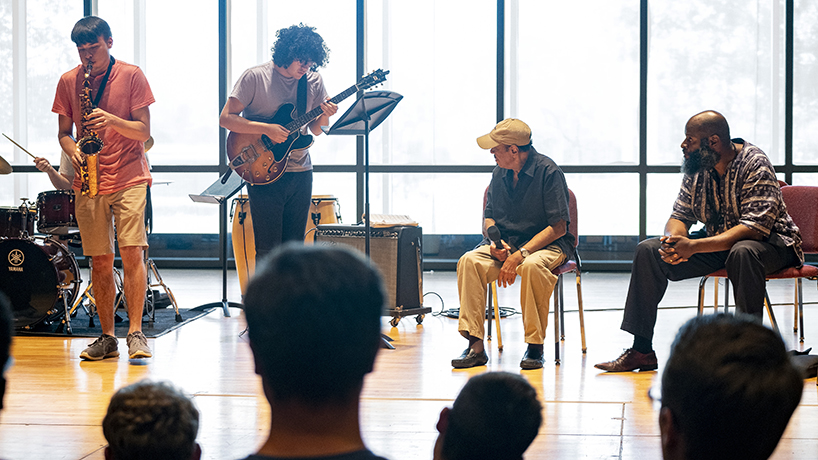
UMSL Jazz Combo members (from left) Ethan Saake, Trae Riley, Mike Owens, Nick Brothers, Dietrich Plyler and Nick Ayala as well as jazz pianist Sharp Radway (far right) listen to tales from behind the music of jazz legend Benny Golson. (Photos by August Jennewein)
The pressure couldn’t have been higher for the University of Missouri–St. Louis Jazz Combo as the group started their rendition of the jazz standard “Blues March” last Monday in the Lee Theater at the Blanche M. Touhill Performing Arts Center.
First came the song’s trademark drum solo, inspired by the marching band of Grambling State University and written for Art Blakey by jazz composer and musician Benny Golson. Then the saxophonists, guitar and piano came in and carried the song for about six more minutes.
When it was all over, the combo turned expectantly to stage left where a 90-year-old legend sat observing them.
“I’m here today to see what I can learn,” Golson said. “It sounds like a joke, but it’s not a joke. As I heard you play, I went back to the days when I was standing where you are now. I didn’t sound this good.”
Thanks to a collaboration with the education arm of Jazz St. Louis, Golson was at UMSL to give the combo a clinic that quickly turned into an hour of advice and storytelling. Also in attendance was pianist Sharp Radway, approximately 20 North County high school students and the event organizers, UMSL Director of Jazz Studies Adaron Johnson and Jazz St. Louis Director of Education Andy Ament.
Golson played with and wrote for the likes of Miles Davis, Dizzy Gillespie, Lionel Hampton, John Coltrane and numerous others. In addition to writing many of the now-standards, he’s received the National Endowment for the Arts Jazz Masters Fellowship, the Mellon Living Legend Legacy Award and the Jazz Outstanding Lifetime Achievement Award and was inducted into the International Academy of Jazz Hall of Fame in 2009.
For the musicians and audience alike, the thrill of having one of the last remaining jazz greats in house could not be overstated.
“It’s a dream come true,” saxophonist Nick Brothers said. “Benny Golson is one of my jazz heroes, and just being in the same room with him, let alone getting to play for him, is awesome. It’s really an amazing opportunity.”
Listen to hear Benny Golson talk about how he became interested in the saxophone, the behind-the-scenes stories of “Stablemates” and “Killer Joe” and the most memorable musician he ever played with.
Brothers took the opportunity to ask about the history of some of his favorite songs, such as Golson’s “Stablemates,” titled for a bar, Stables, in Boston.
“If I tell you the story behind “Stable,” you’ll never believe it,” Golson said. “Do you want to hear it?”
Golson told the crowd how he’d started writing the tune during the half-an-hour break between sets in order to avoid his then-wife, with whom he was in the middle of a divorce.
“I pretended that I had a commission that was so important that I couldn’t leave the bandstand,” he said, explaining that he’d temporarily titled the composition ‘Weird Tune” because of its unusual structure.
Golson intended to return and fix the musical mutant but never got around to it. Shortly afterward, he ran into John Coltrane, who asked for songs for Miles Davis.
“John took this to Miles, and I never thought about anything ’cause nobody’d ever recorded anything of mine,” Golson recalled. “And I saw him about a month later, and he didn’t even say hello. He said, ‘You know that tune you gave me?’ I said, ‘Yeah.’ He said, ‘We recorded it.’ I said, ‘What? Miles recording my tune!’ He said, ‘Yeah, he dug it.’ I was levitating. And when I saw Miles, Miles said to me, ‘What were you smoking when you wrote that?’
“Well, I was smoking nothing. But that’s what got me started as a jazz composer. All those tunes I’d been passing out that people are throwing in the trash, under the rug – when they saw ‘Stablemates’ and saw ‘Benny Golson’ underneath and – ‘Wait a minute – Benny Golson – that’s the guy that gave me –.’ They started looking for the tunes. They started recording my stuff. Miles Davis put me on the map, and I owe it to my friend, John Coltrane, who took the tune. Oh, we laughed about that. We laughed about that quite a bit as the years went by. I don’t know what would have happened had Miles not gotten that tune.”
He spoke about “Blues March,” where the title “Killer Joe” came from, the most memorable musician he ever played with – Blakey – and how, after hearing Arnett Cobb on the radio as a boy, Golson became interested in the saxophone. He disappointed his mother, who’d hoped he would become a church organist.
Golson also shared his perspective on the industry and other advice with the students. He spoke about the importance of teachers, noting that music is as much about learning as performing. He also talked about changes in the industry and songwriting as inevitable and parallel to the nature of jazz.
He closed out the afternoon by giving out one last piece of wisdom.
“Never think too much of yourself,” he said. “There’s always somebody somewhere else that can do it just a little better. And never think you know everything. Nobody on this earth knows everything. I’m still learning. And when I came in and said I came in to learn something from the students, that’s not always a joke. Sometimes I learned things from the students. Why? Because I’m an old man. And they’re young, fresh ideas, new ways to do things. That’s what makes this business of music such an adventure. And it should always be an adventure.”















